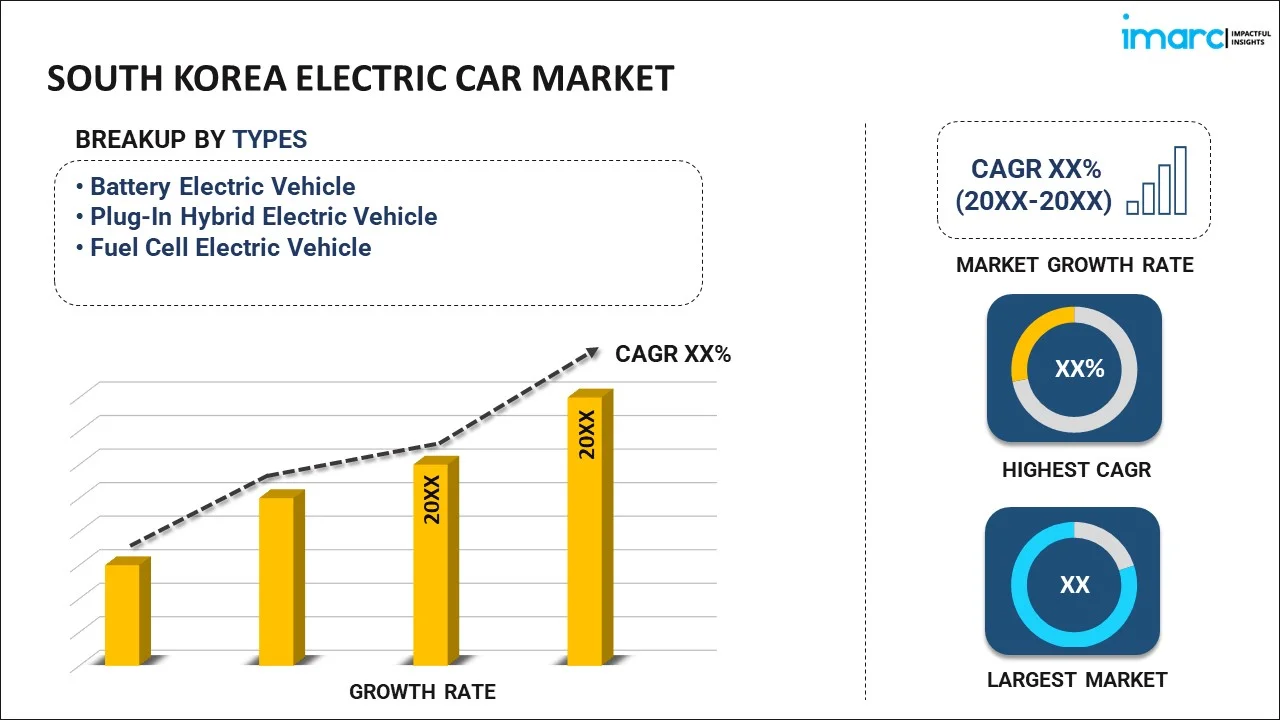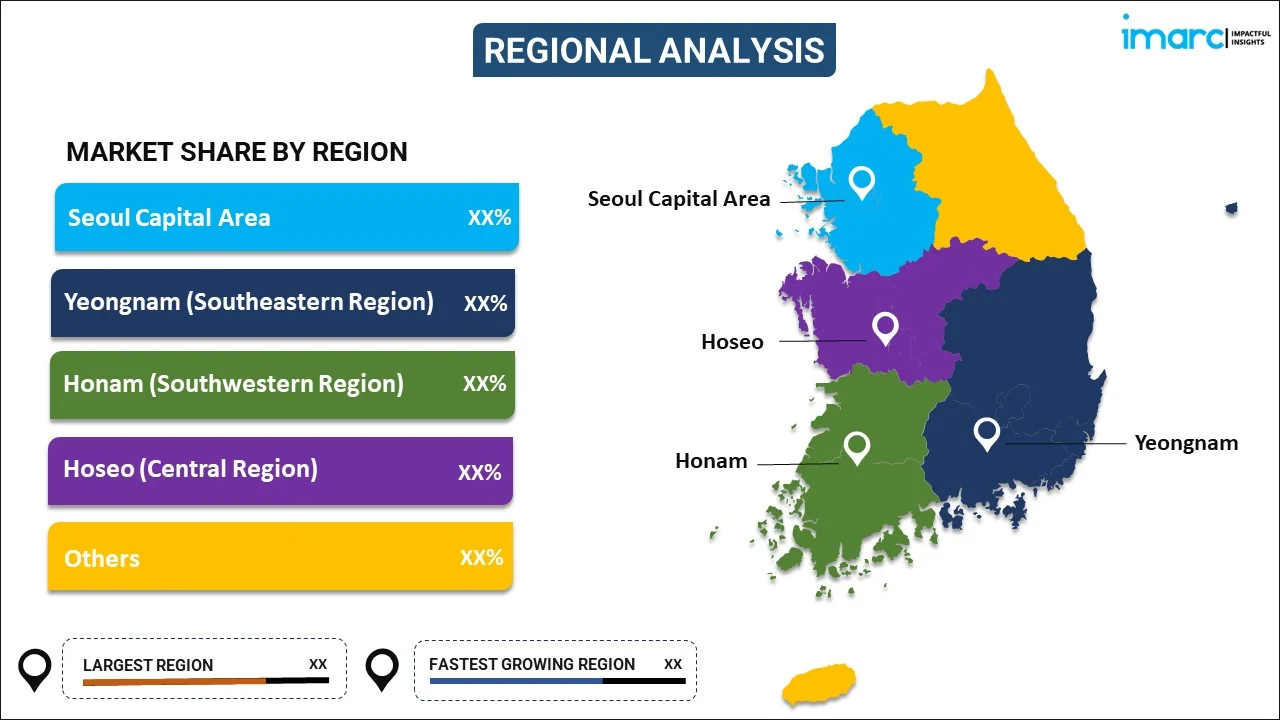
South Korea Electric Car Market Report by Type (Battery Electric Vehicle, Plug-In Hybrid Electric Vehicle, Fuel Cell Electric Vehicle), Vehicle Class (Mid-Priced, Luxury), Drive Type (Front Wheel Drive, Rear Wheel Drive, All-Wheel Drive), and Region 2026-2034
South Korea Electric Car Market Size Overview:
South Korea electric car market size reached USD 3,394.3 Million in 2025. Looking forward, IMARC Group expects the market to reach USD 39,773.4 Million by 2034, exhibiting a growth rate (CAGR) of 31.45% during 2026-2034. The growing awareness of environmental issues, including climate change and air pollution, which has led to increased interest in electric vehicles as a cleaner and more sustainable transportation option, is driving the market.
|
Report Attribute
|
Key Statistics
|
|---|---|
|
Base Year
|
2025 |
|
Forecast Years
|
2026-2034
|
|
Historical Years
|
2020-2025
|
| Market Size in 2025 | USD 3,394.3 Million |
| Market Forecast in 2034 | USD 39,773.4 Million |
| Market Growth Rate (2026-2034) | 31.45% |
An electric car, also known as an EV (electric vehicle), is an automobile that relies on electric propulsion for power. Unlike traditional internal combustion engine vehicles that use gasoline or diesel, electric cars are equipped with rechargeable batteries and electric motors. These vehicles produce zero tailpipe emissions, contributing to a cleaner and more environmentally friendly mode of transportation. The batteries store electricity, usually derived from the electrical grid, which powers the electric motor, propelling the vehicle. Electric cars have gained popularity due to their lower operating costs, reduced environmental impact, and advancements in battery technology, extending their driving range. With ongoing efforts to enhance charging infrastructure and battery efficiency, electric cars play a crucial role in the transition toward sustainable and energy-efficient transportation solutions, reducing dependence on fossil fuels and mitigating environmental challenges associated with traditional vehicles.
South Korea Electric Car Market Trends:
The electric car market in South Korea has experienced exponential growth over the past decade, driven by several key factors. Firstly, the increasing regional awareness and concern about environmental sustainability have prompted a significant shift towards cleaner and greener transportation alternatives. Governments are actively supporting this transition by implementing stringent emission regulations and offering incentives for electric vehicle adoption. Consequently, consumers are becoming more environmentally conscious, fostering a rising demand for electric cars. Moreover, advancements in technology have played a pivotal role in enhancing the performance and affordability of electric vehicles. Breakthroughs in battery technology, particularly the development of high-capacity and cost-effective batteries, have significantly extended the range of electric cars and made them more accessible to a broader consumer base. Simultaneously, a growing charging infrastructure has addressed the range anxiety associated with EVs, further encouraging consumers to make the switch. Additionally, the automotive industry's commitment to innovation and competition among manufacturers has spurred the production of diverse electric models with improved features, appealing designs, and competitive pricing. As electric cars become more mainstream, their cost of ownership is expected to decrease, making them a compelling choice for a wider spectrum of consumers. In essence, the regional electric car market is being propelled by a confluence of environmental consciousness, technological advancements, supportive government policies, and increased market competition.
South Korea Electric Car Market Segmentation:
IMARC Group provides an analysis of the key trends in each segment of the market, along with forecasts at the country level for 2026-2034. Our report has categorized the market based on type, vehicle class, and drive type.
Type Insights:

- Battery Electric Vehicle
- Plug-In Hybrid Electric Vehicle
- Fuel Cell Electric Vehicle
The report has provided a detailed breakup and analysis of the market based on the type. This includes battery electric vehicle, plug-in hybrid electric vehicle, and fuel cell electric vehicle.
Vehicle Class Insights:
- Mid-Priced
- Luxury
A detailed breakup and analysis of the market based on the vehicle class have also been provided in the report. This includes mid-priced and luxury.
Drive Type Insights:
- Front Wheel Drive
- Rear Wheel Drive
- All-Wheel Drive
The report has provided a detailed breakup and analysis of the market based on the drive type. This includes front wheel drive, rear wheel drive, and all-wheel drive.
Regional Insights:

- Seoul Capital Area
- Yeongnam (Southeastern Region)
- Honam (Southwestern Region)
- Hoseo (Central Region)
- Others
The report has also provided a comprehensive analysis of all the major regional markets, which include Seoul Capital Area, Yeongnam (Southeastern Region), Honam (Southwestern Region), Hoseo (Central Region), and Others.
Competitive Landscape:
The market research report has also provided a comprehensive analysis of the competitive landscape. Competitive analysis such as market structure, key player positioning, top winning strategies, competitive dashboard, and company evaluation quadrant has been covered in the report. Also, detailed profiles of all major companies have been provided.
South Korea Electric Car Market Report Coverage:
| Report Features | Details |
|---|---|
| Base Year of the Analysis | 2025 |
| Historical Period | 2020-2025 |
| Forecast Period | 2026-2034 |
| Units | Million USD |
| Scope of the Report | Exploration of Historical and Forecast Trends, Industry Catalysts and Challenges, Segment-Wise Historical and Predictive Market Assessment:
|
| Types Covered | Battery Electric Vehicle, Plug-In Hybrid Electric Vehicle, Fuel Cell Electric Vehicle |
| Vehicle Classes Covered | Mid-Priced, Luxury |
| Drive Types Covered | Front Wheel Drive, Rear Wheel Drive, All-Wheel Drive |
| Regions Covered | Seoul Capital Area, Yeongnam (Southeastern Region), Honam (Southwestern Region), Hoseo (Central Region), Others |
| Customization Scope | 10% Free Customization |
| Post-Sale Analyst Support | 10-12 Weeks |
| Delivery Format | PDF and Excel through Email (We can also provide the editable version of the report in PPT/Word format on special request) |
Key Questions Answered in This Report:
- How has the South Korea electric car market performed so far and how will it perform in the coming years?
- What is the breakup of the South Korea electric car market on the basis of type?
- What is the breakup of the South Korea electric car market on the basis of vehicle class?
- What is the breakup of the South Korea electric car market on the basis of drive type?
- What are the various stages in the value chain of the South Korea electric car market?
- What are the key driving factors and challenges in the South Korea electric car?
- What is the structure of the South Korea electric car market and who are the key players?
- What is the degree of competition in the South Korea electric car market?
Key Benefits for Stakeholders:
- IMARC’s industry report offers a comprehensive quantitative analysis of various market segments, historical and current market trends, market forecasts, and dynamics of the South Korea electric car market from 2020-2034.
- The research report provides the latest information on the market drivers, challenges, and opportunities in the South Korea electric car market.
- Porter's five forces analysis assist stakeholders in assessing the impact of new entrants, competitive rivalry, supplier power, buyer power, and the threat of substitution. It helps stakeholders to analyze the level of competition within the South Korea electric car industry and its attractiveness.
- Competitive landscape allows stakeholders to understand their competitive environment and provides an insight into the current positions of key players in the market.
Need more help?
- Speak to our experienced analysts for insights on the current market scenarios.
- Include additional segments and countries to customize the report as per your requirement.
- Gain an unparalleled competitive advantage in your domain by understanding how to utilize the report and positively impacting your operations and revenue.
- For further assistance, please connect with our analysts.
 Request Customization
Request Customization
 Speak to an Analyst
Speak to an Analyst
 Request Brochure
Request Brochure
 Inquire Before Buying
Inquire Before Buying




.webp)




.webp)












